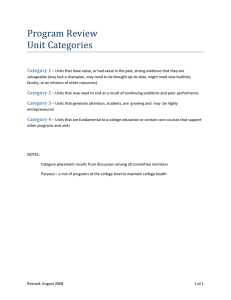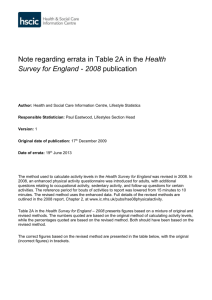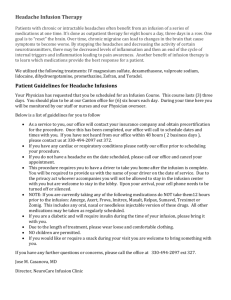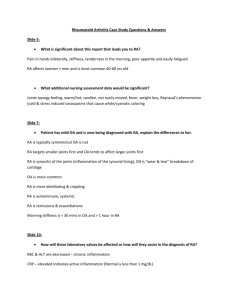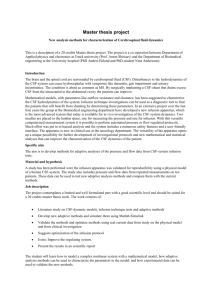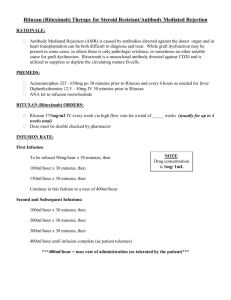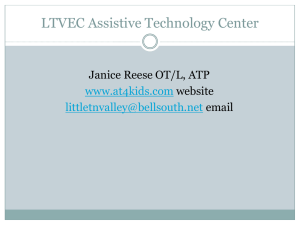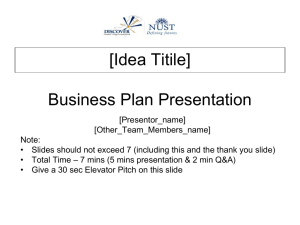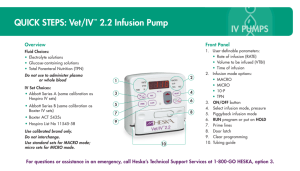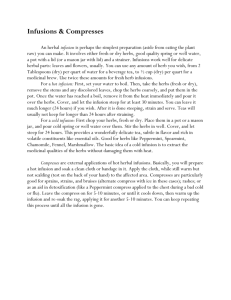Thinking Skills and Personal Capabilities
advertisement
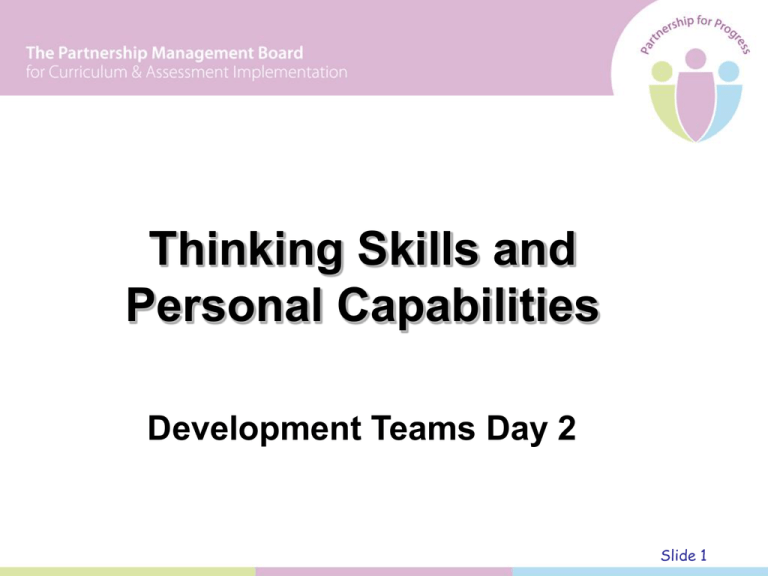
Thinking Skills and Personal Capabilities Development Teams Day 2 Slide 1 Aim: • To begin to develop the Development Team in its role of supporting the implementation of the Revised Curriculum. Learning Intentions: • To clarify the role of the Development Team in the support model for the implementation process. • To consider the skills and approaches which they will use to engage all staff in the process. • To explore the learning experiences that characterise the Revised Curriculum. • To consider approaches to planning for implementation. Thinking Skills and Personal Capabilities Thinking Skills and Personal Capabilities – at the end of this day participants will: At the end of this day participants will: • Understand the contribution of Thinking Skills and Personal Capabilities in the Revised Curriculum • Be more familiar with the elements of the Thinking skills and Personal Capabilities framework • Appreciate how the individual skills and capabilities can be developed through learning experiences • Have considered implications for planning back at school – first steps Session 1 Session 1 • The rationale for the Thinking Skills and Personal Capabilities framework • The key contribution of Thinking Skills and Personal Capabilities to the Revised Curriculum Thinking, Problem Solving Decision Making Managing Information Being Creative & Working with Others Self Management The Northern Ireland Curriculum aims to empower young people to achieve their potential and to make informed and responsible decisions throughout their lives. Curriculum Aim Curriculum Objectives To develop the young person as an individual To develop the young person as a contributor to the economy & environment To develop the young person as a contributor to society FOR Learning for Life and Work Personal Development Home Economics Local & Global Citizenship Education for Employability THROUGH personal understanding mutual understanding personal health moral character spiritual awareness Key Elements citizenship cultural understanding media awareness ethical awareness employability economic awareness education for sustainable development INFUSING Whole Curriculum Skills and Capabilities THINKING SKILLS & PERSONAL CAPABILITIES • Managing Information • Thinking, Problem Solving, Decision Making • Being Creative • Working with Others • Self Management FORMALLY ASSESSED SKILLS •Communication •Using Mathematics •ICT ACROSS General Learning Areas The Arts Environment & Society English & Irish Mathematics Modern including financial capability Languages Science & Technology Physical Education Religious Education Promoting/Encouraging Learning Experiences Assessment for Learning Attitudes and Dispositions Investigating & problem solving Linked to other curriculum areas Relevant & enjoyable Media rich Challenging & engaging Supportive environment Culturally diverse Positive reinforcement Building a more open relationship between learner and teacher Clear learning intentions shared with pupils Personal responsibility Self-belief-optimism-pragmatism Shared/ negotiated success criteria Individual target setting concern for others curiosity community spirit Taking risks for learning Skills integrated Active & hands on Varied to suit learning style Advice on what to improve & how to improve it Ongoing reflection Peer and self assessment commitment-determination – resourcefulness flexibility tolerance Offers choice integrity-moral courage Enquiry based Celebrating success Peer and self evaluation of learning openness to new ideas respect Activity 1 (10 minutes) Activity 1 (10 minutes) As a group, •Discuss the contribution of the Thinking Skills and Personal Capabilities framework to the curriculum objectives of the Revised Curriculum •Write your response on your flip chart paper. Setting the context • Neurological research • Learning styles • Thinking about thinking • Recent research and associated programmes Coffee Session 2: Session 2 The Thinking Skills and Personal Capabilities Framework: • key elements • infusion • Implications for learners, teachers and classrooms Activity 2 (10+ 10 mins) Interrogating the Framework • • • • • Each group has been assigned one strand from the Thinking Skills and Personal Capabilities Framework Read the description provided (extract from TS&PC handbook) Extract the words or phrases describing the activities which capture the essence of the strand. Record on flipchart Reflect on the implications for classroom practice Record on your individual sheet Activity 3 Planning for Infusion Activity 3 (30+10 minutes) Planning for Infusion • Use the stimulus material to plan an innovative learning activity which will promote one aspect of TS&PC • • Step 1: Generating ideas (10 mins) • Step 2: Planning a lesson - Identify one TS&PC and • one GLA learning intention (20 mins) • Step 3: Share your lesson ideas with another group • (10 mins) An example of a creative tool for generating, developing and evaluating ideas Let’s generate some ideas. . . . . . . . . . . . . . . . . . . . . . . . . . . . . . . . . . . . . . . . . . . . . . . . . All ideas, Be uncritical Take risks Analyse Judge Question Focus on Quantity Focus on Quality Best ideas Planning Planning for Infusion Planning for Infusion Planning for Infusion for Infusion Lunch Session 3: Session 3 Thinking Skills and Personal Capabilities Key Messages and Implications Activity 4:Review(15 minutes) The experience so far The experience so far In pairs (5 minutes) and then as a group (10 minutes) reflect on these questions • What are the key learning points for you so far? • How did you feel during the morning activities? What Activity next? 5 – Moving on (20 mins) Problem Solving Consider Step 1: Where do you want to be after a year? Step 2: What are the possible challenges or obstacles Step 3: What are your assets - people, practice, resources, structures…. Step 4: Generate possible options and make decision Step 5: Action plan Aim: • To begin to develop the development Team in its role of supporting the implementation of the Revised Curriculum. Learning Intentions: • To clarify the role of the Curriculum Leader Team in the support model for the implementation process. • To consider the skills and approaches which they will use to engage all staff in the process. • To explore the learning experiences that characterise the Revised Curriculum. • To consider approaches to planning for implementation.
